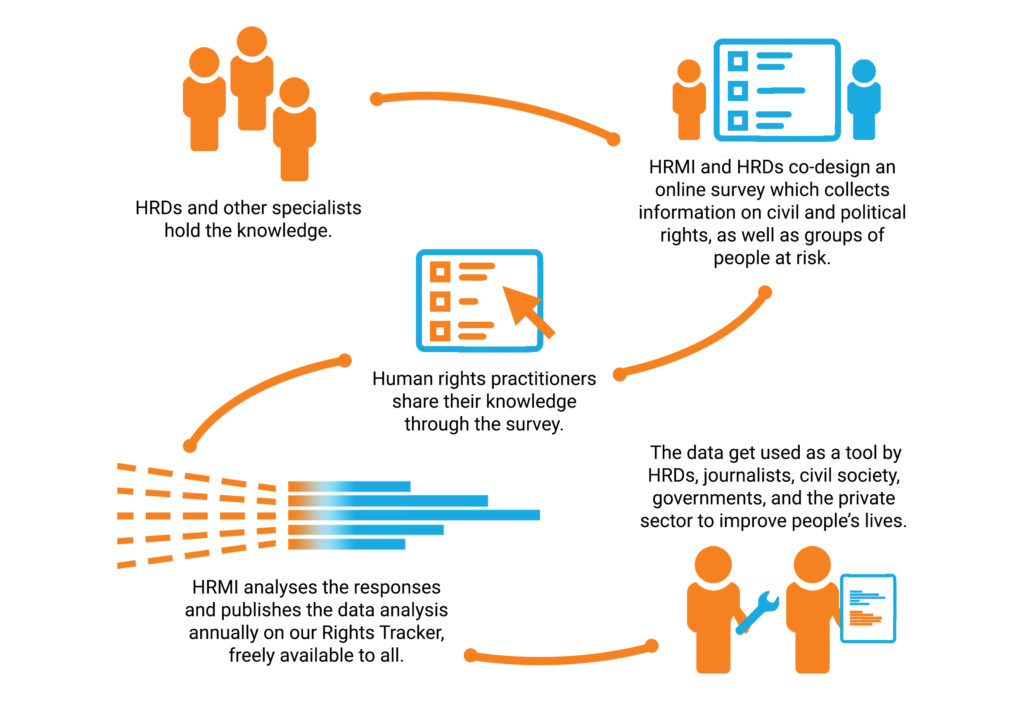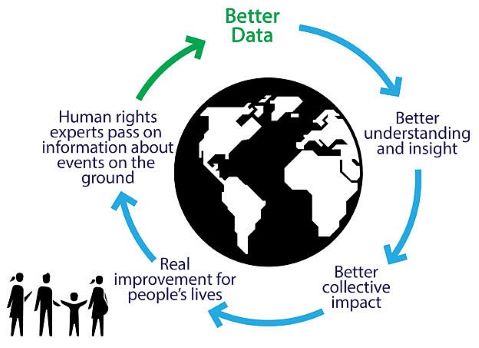Could you be a HRMI Ambassador?
HRMI’s goal is to improve people’s lives, worldwide, by producing robust, comparable data on the human rights performance of countries. The data is published each year on our Rights Tracker.
Can you help us do that, by becoming a HRMI Ambassador?
Who can be a HRMI Ambassador?
We are looking for people who are:
- actively working in human rights
- well connected in the human rights community so they can get in touch with a range of different human rights experts and encourage them to participate in the expert survey
- able to offer 1-2 hours a week over January-March each year (only occasional time over the rest of the year)
- able to communicate with HRMI staff in English
- ideally based in the country in question, unless it is a country that is unsafe for human rights defenders
- committed to confidentiality and data security to keep people safe
- interested in seeing better human rights data for their country.
HRMI staff will provide full information and training to new Ambassadors.
How does HRMI work with HRDs in each country?

Why do we need Ambassadors?
HRMI’s aim is to produce human rights measurements for all the countries in the world. Our civil and political rights data are collected directly from human rights experts in each country we’re working in. The countries we are currently running the survey in are listed on the country coverage page. We plan to expand to all countries in the world as soon as we have funding.
To do this, we work with local partners – people who are part of the local human rights community, who understand the local culture, and whose values are aligned with ours. In each country we collect data, we appoint one or more Ambassadors to be our key point of contact.
These people play an important role in connecting HRMI to the local human rights community, and helping to ‘get the snowball started‘.
What is the ‘snowball’? This is the method we use for identifying human rights experts in each country. We will ask each Ambassador, and other trusted partners, to contact people who they think are qualified to contribute knowledge for their country and encourage them to sign up as potential survey respondents. Then we will ask each of those nominated people a) to participate and b) to recommend others. And so the snowball grows.
What will Ambassadors do?
We’re getting ready, right now, to roll out next year’s expert survey.
Here’s a timeline of what’s involved in being an Ambassador.
December (of each year)
Help us recruit potential survey respondents for your country.
We will ask you to:
- contact the people you think meet our criteria for being survey respondents (NGO researchers or advocates, human rights lawyers, and journalists reporting on human rights issues) and encourage them to sign up as potential survey respondents (using a secure encrypted link we will give you).
- put some thought into how to actively recruit for diversity among the pool of survey respondents. For example, we want to make sure we have experts with knowledge of different language and ethnic groups, people from throughout the country, and a range of expertise regarding specific human rights issues, including gender, disability, LGBTQIA+, economic and social rights, and so on.
- advise us on any dates to avoid in late January-February for us to start sending out the expert survey, such as local holidays and so on.
January
- If your country has languages other than English in common use, we might ask you to help us review the translation of the expert survey, and the emails that we will be sending to survey respondents. We use professional translators to translate these documents, but it is good to have someone who knows our work check these before we send them out.
Late January/Early February
- Get in touch with any potential survey respondents you know, to tell them the survey will be coming soon and encourage them to complete the survey. You can do this by sending them a personal email or text message or by talking to them in person.
- If needed we may also ask you to remind people again in February or March.
What support will Ambassadors get from HRMI?
Our staff are there to support you every step of the way. We’re available by secure email, Zoom, or any other method of communication that suits you best.
It’s important that we talk together regularly to support you and make sure you have everything you need. For low and middle income countries that have high internet costs, we are trialling offering a small financial contribution to make sure you can always get in touch.
Benefits of participating
Ambassadors are volunteers, and we want the role to be mutually beneficial. We will be glad to include your name, photograph, and bio on the team page of our website, if you want us to, and to provide any other formal acknowledgements that would be useful to you of your role in the project. You are welcome to include your involvement on your CV or résumé.
The main benefit of participating, of course, is that you’ll be part of producing up-to-date, robust human rights data for your country, that will likely help in your own work, and make a difference to people’s lives.
For some examples of HRMI data being used for advocacy in journalism, have a look here.
If there are other ways we can help you in your work, please get in touch, anytime.
Join us and make a difference in your country!
You can be part of producing robust, extensive data on your country’s human rights performance that you can use in your advocacy and that others will also use to help bring about real improvement for people’s lives.

What are the stories you want to be able to tell about human rights violations in your country? HRMI data can help.
If you would like HRMI to be able to produce data for your country, please get in touch.
Do you want to be a HRMI Ambassador?
Please get in touch! We’d love to hear from you. Click here for FAQs for survey respondents.

